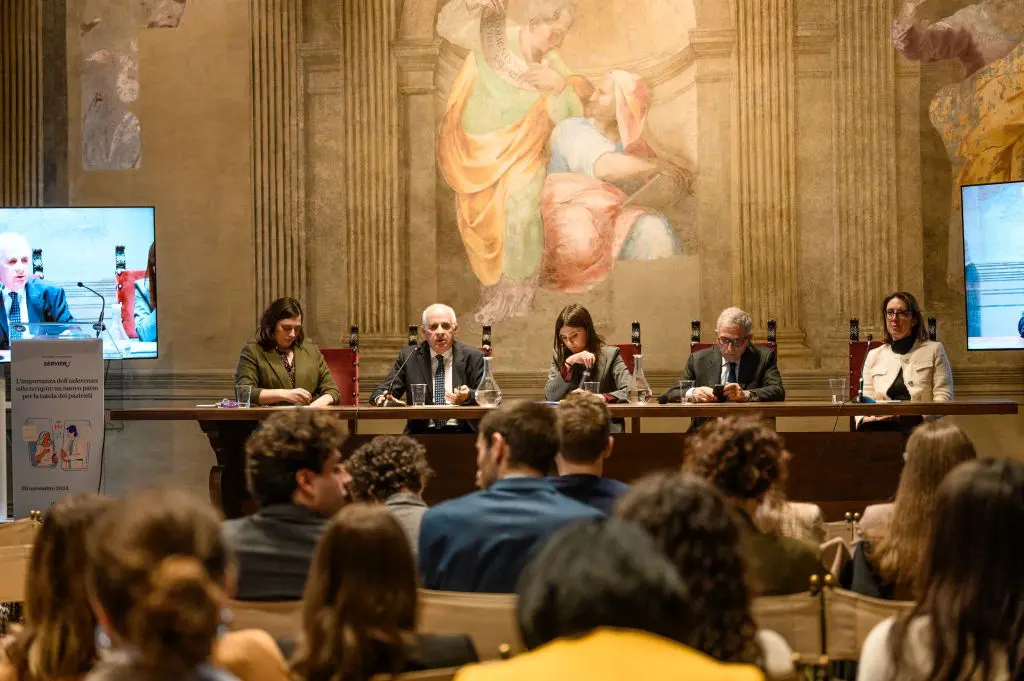ROME (ITALPRESS) – The conference “The importance of therapy adherence: a new pact to protect patients” was held in Rome. The day, made possible thanks to the nonconditional contribution of the Servier Group in Italy, brought together representatives from institutions, healthcare and industry to address the issue of therapeutic adherence, now considered a strategic priority of the National Health Service with a view to improving clinical outcomes and patients’ quality of life.Institutional greetings were opened by Ilenia Malavasi, Member XII Commission of the Chamber of Deputies, who highlighted the growing attention of politics to therapeutic adherence, an aspect that affects both the health of patients and the sustainability of the healthcare system. “Therapeutic adherence represents a complex challenge that requires a systemic vision and clear objectives,” Malavasi said. “Making adherence measurable, through tools that analyze trends and identify critical areas, is essential to guide effective strategies. Only concrete and reliable data, defined through a public-private partnership, can guide institutions in defining targeted interventions, improving the effectiveness of treatment and ensuring equitable access to care.” The discussion began with contributions from influential healthcare leaders, who delved into the challenges and priorities for increasing treatment adherence. Manuela Bocchino of the Istituto Superiore di Sanità, Massimo Volpe, Professor Emeritus of Cardiology at the University of Rome “La Sapienza,” and Massimo Sabatini, Italian Federation of General Practitioners, highlighted the importance of telemedicine and continuous monitoring as strategic tools, also highlighting how effective doctor-patient communication can contribute significantly to improving their quality of life and treatment success. While Carlotta Lunghi, a Researcher at the Department of Medical and Surgical Sciences at the Alma Mater Studiorum of the University of Bologna, illustrated the role of analytical methodologies and monitoring systems in improving therapeutic persistence and coverage, with a focus on therapies. “Continuous monitoring represents an essential tool to improve therapeutic adherence, especially in chronic diseases,” said Bocchino. “Introducing an indicator of adherence at the national level would allow for the systematic detection of trends, providing a clear view of areas in which to intervene to optimize treatment pathways. Only an integrated approach based on objective data can positively affect public health and the sustainability of the healthcare system, guiding us toward the adoption of targeted measures. “Sabatini also emphasized the value of the General Practitioner’s continuity of care: “Only with an effective dialogue between all healthcare components can we build a solid and sustainable response to citizens’ needs.” “The General Practitioner,” he continued, “in particular, can play a decisive role not only in the use of digital and technological tools, as well as suitable therapeutic solutions such as fixed combinations for more effective therapy management, but also in promoting constant communication, which is essential to intercept the needs of the people in their care and improve their quality of life. In addition, I find it essential to enhance not only the concept of adherence but also the concept of persistence. The introduction of an adherence indicator would provide a reliable basis for monitoring treatment progress, helping healthcare professionals to intervene promptly where necessary.” The event concluded with a call for institutions and industry to work together to promote a pact to protect patients and healthcare sustainability. It emerged how therapeutic adherence is not only the responsibility of the patient, but a shared goal that requires synergy and commitment at all levels, from policy makers to healthcare professionals and caregivers. Only through systematic and integrated collaboration will it be possible to ensure more effective care while reducing costs and improving patients’ quality of life.
– press office photo Esperia Advocacy -(ITALPRESS).

